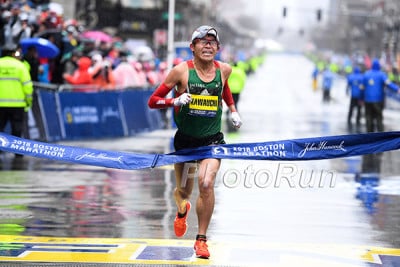The People’s Marathoner Yuki Kawauchi Wins the 2018 Boston Marathon
by LetsRun.com
April 16, 2018
BOSTON — Everyone suffered at the 2018 Boston Marathon. So it was fitting that Yuki Kawauchi, the Japanese Emperor of Pain, was the last man left standing in a wild race, winning his first World Marathon Major in 2:15:54, the slowest winning time since 1976.
On a day when the horrific weather conditions – rain, head wind, and bone-chilling temperatures – literally wiped out huge swaths of the elite field, it was more than appropriate that the first man across the finish line was Kawauchi, the only man in the field who had run a marathon in arguably worst conditions.
Kawauchi, a full-time government clerk for the Saitama Prefectural Government in his native Japan, gets limited time off to travel and race around the world. But around New Year’s (a big holiday in Japan), he found himself with some extra vacation days and spent them previewing the Boston Marathon course. A prolific racer, he was also chasing the world record for most career sub-2:20 marathons, so while he was in the states, he hopped into the Marshfield (MA) New Year’s Day Marathon — a completely amateur race with no entry fee — even though the temperature was just 1 Degree (-13 Celsius) and he won it in 2:18:59 (he was the only finisher). It was his 76th career sub-2:20 marathon, the most in history (counting Boston, he’s now up to 79. Kawauchi also holds the record for most sub 2:12s at 26).
Today, Kawauchi showed no fear alongside his trademark toughness. He ran the first (downhill) mile in 4:37, which is 2:01:02 marathon pace, to open up an immediate gap. Though the pack caught up to him by mile 4, Kawauchi would attack again and again throughout the race, seemingly unaffected by the conditions (unlike most of the elites, Kawauchi wore no jacket, though he did sport arm warmers and gloves for the duration of the race).
Kawauchi’s early splits were so fast for the day – and the corresponding women’s race splits so slow – that NBCSN broadcaster Craig Masback refused to read them on air as to him they didn’t make sense (the leaders hit 10k on 2:07 pace) and he thought something was off with the timing mats.
By halfway (65:59), the pace had started to slow considerably and the lead pack featured around a dozen guys (including pre-race favorites Galen Rupp, Tamirat Tola, and Geoffrey Kirui) at the front. The pace would slow even more over the second half as the conditions took their toll, resulting in double-digit DNFs from the elite field.
Kawauchi attacked again during mile 16, but the big move came just after 17 miles. The weather and hills were already starting to wreak their havoc as American Galen Rupp started to fall off the back and former Oregon teammate Shadrack Biwott went to the lead. And that is when defending champ Geoffrey Kirui made a huge move up the Newton Hills. Kirui looked to be cruising, going 5:01-4:50-5:05 for miles 18, 19, and 20, before running a 5:24 up Heartbreak Hill. By 19 miles, his lead was so large that the lead vehicle could not even see second place. At 35k (21.75 miles), it was up to 1:31 and Kirui looked unstoppable.
But after cresting the Newton Hills, Kirui’s lead began to evaporate just as quickly as he had built it. Mile 22 was a respectable 5:04, but then a 5:19 and 5:31 on downhill miles 23 and 24 showed Kirui was running into trouble. He split the downhill 5k from 35k to 40k in 17:33 (5:38.9 mile pace) and his lead was down to 20 seconds over Kawauchi, who covered the same ground in 16:22 (5:16.1 mile pace). It was on the 25th mile when the wheels really fell apart for Kirui as it was run in 6:31 (leader to leader -we’re not sure who led exactly at 25 miles) as Kawauchi soon approached and passed Kirui and would power to victory thanks to a 5:12 final mile while Kirui’s staggered home in 7:18.
Kawauchi had known Kirui was in front of him but he went by Kirui so fast (he trailed Kirui by 20 seconds at 40k (24.8 miles), and just .4 miles later, with a mile to go in the race he was 19 seconds ahead of Kirui) that Kawauchi said he wasn’t sure who he passed and said he wasn’t even sure he was winning the race until he saw the marshalls directing him to finish on the right side of the street. At the pre-race technical meeting, Kawauchi said race organizers told the athletes that if they were winning the race, they would be directed to finish on the right for the cameras. And sure enough, that’s exactly where they were directing Kawauchi – your improbable 2018 Boston Marathon Champion.
Kawauchi celebrated appropriately as shown here:
Kirui managed to hold on for second in 2:18:23 ahead of Shadrack Biwott, a teammate of women’s winner Desi Linden with the Hansons-Brooks Original Distance Project who moved up one spot from last year to finish third in 2:18:35. Chicago Marathon champ Galen Rupp, who was hoping to be the first American born winner in the professional era, reached 30k (18.64 mil) in 9th 1:36:03 – 1:05 behind Kirui – but dropped out before the 21 mile mark.
Quick Take #1: How did Kawauchi win? He can suffer more than anyone else
As we said in our women’s recap, the real winner today was the weather as many of the pre-race favorites such as Galen Rupp, Tamirat Tola, and Lelisa Desisa wound up dropping out on a miserable day for running. But Kawauchi is used to suffering as he basically averages a marathon per month. This was his fourth marathon of the year and it ended up being surprisingly his fourth win of the year.
Kawauchi won by simply not succumbing to the conditions. He was the only elite in the top 12 who ran his second half within 4 minutes of his first half (65:59-69:59) and that was enough to make him the first across the finish line.
When asked on the international television broadcast by reporter Scott Wahle how he was able to pull up such a big comeback, Kawauchi said through his agent/interpretor Brett Larner, “I never gave up. I knew he was up there. I could see him and I just ran my own race. I ran the way that I run best and I ran him down.”
Then Wahle said, “In awful conditions too” and Kawauchi responded with an all-time classic line of, “”For me, these were the best conditions possible.”
Kawauchi’s statement about the weather is 100% correct and it is pretty much what anyone who has followed Kawauchi’s career from the beginning would expect. Remember, this is a guy who when his pbs were just 13:59 for 5k and 29:02 for 10k ran 2:08:37 in Tokyo in 2011 and passed out at the finish line and then famously said, “Every time I run, it’s with the mindset that if I die at this race it’s OK.”
MB: 13:59 5k, 29:02 10k Japanese AMATEUR Runs 2:08:37 at Tokyo Marathon and Passes Out
MB: Kawauchi Quote – Are you willing to put it all on the line?
Kawauchi holding up late wasn’t far from a shock (but his win was). We spoke to one agent after the race, who told us his advice to his athlete was simply to follow Kawauchi late in the race as he knew Kawauchi had the greatest ability to suffer and would be least affected by the conditions.
Quick Take #2: We know Kirui didn’t win but he’s something special
Around mile 20, when Kirui had a massive lead and looked on his way to yet another victory, we thought to ourselves, “We have to start thinking about, ‘How does this guy stack up against Eliud Kipchoge?’ as this is going to be his third straight major marathon win (after winning Boston last year, he also won Worlds) and no one but Kipchoge does anything like that in the year 2018.’
Still, Kirui held up way better than every single other African athlete by a long shot.




